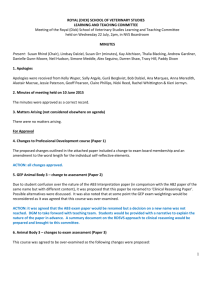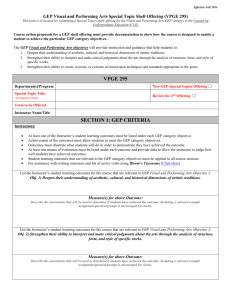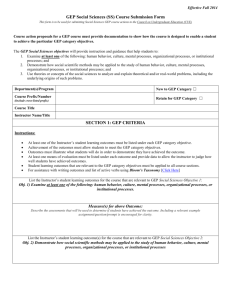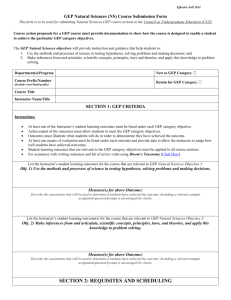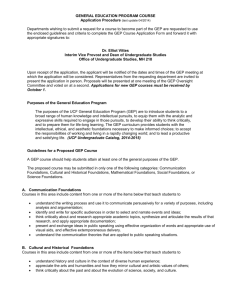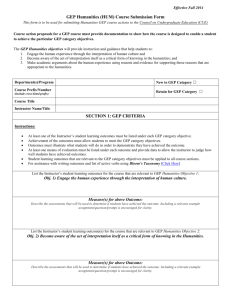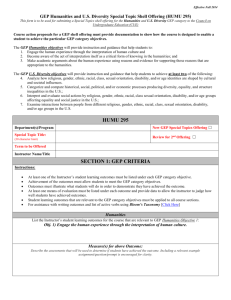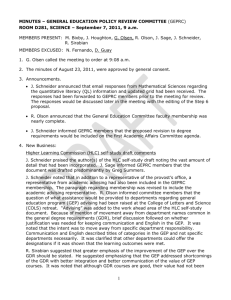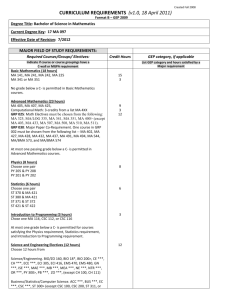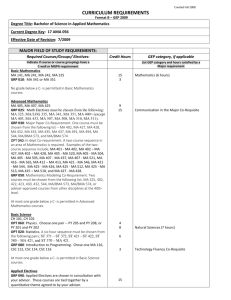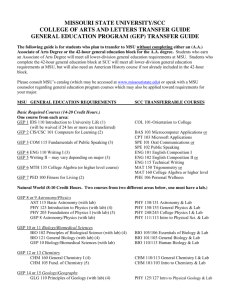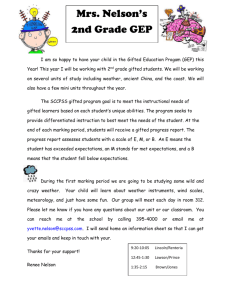Click to
advertisement
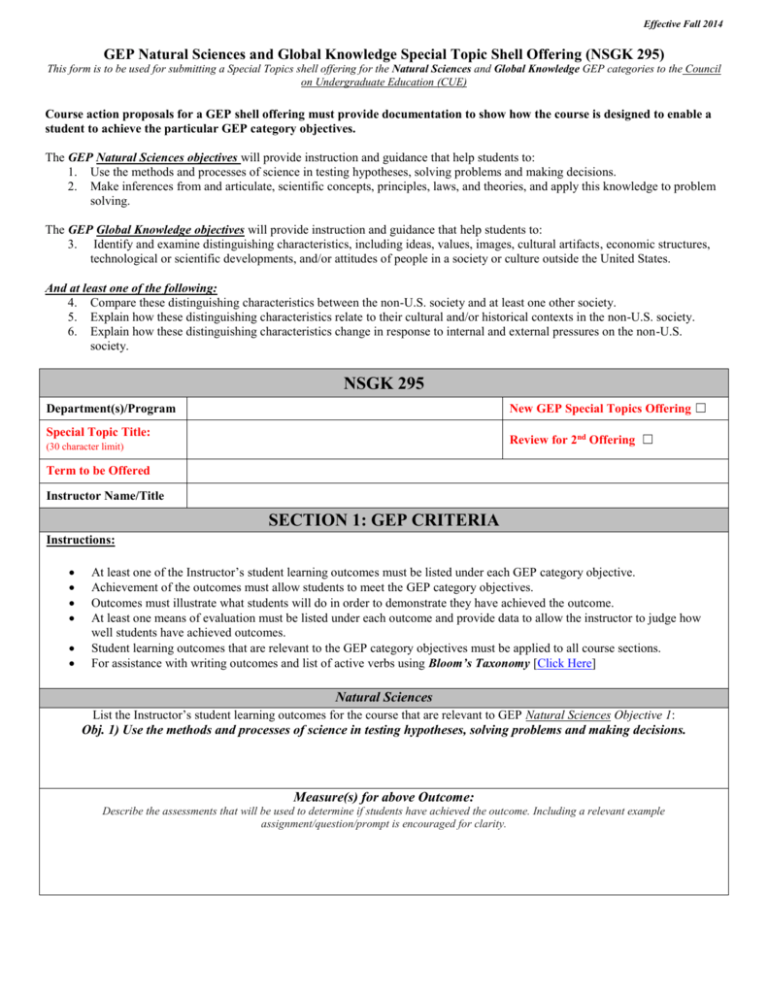
Effective Fall 2014 GEP Natural Sciences and Global Knowledge Special Topic Shell Offering (NSGK 295) This form is to be used for submitting a Special Topics shell offering for the Natural Sciences and Global Knowledge GEP categories to the Council on Undergraduate Education (CUE) Course action proposals for a GEP shell offering must provide documentation to show how the course is designed to enable a student to achieve the particular GEP category objectives. The GEP Natural Sciences objectives will provide instruction and guidance that help students to: 1. Use the methods and processes of science in testing hypotheses, solving problems and making decisions. 2. Make inferences from and articulate, scientific concepts, principles, laws, and theories, and apply this knowledge to problem solving. The GEP Global Knowledge objectives will provide instruction and guidance that help students to: 3. Identify and examine distinguishing characteristics, including ideas, values, images, cultural artifacts, economic structures, technological or scientific developments, and/or attitudes of people in a society or culture outside the United States. And at least one of the following: 4. Compare these distinguishing characteristics between the non-U.S. society and at least one other society. 5. Explain how these distinguishing characteristics relate to their cultural and/or historical contexts in the non-U.S. society. 6. Explain how these distinguishing characteristics change in response to internal and external pressures on the non-U.S. society. NSGK 295 Department(s)/Program New GEP Special Topics Offering ☐ Special Topic Title: Review for 2nd Offering ☐ (30 character limit) Term to be Offered Instructor Name/Title SECTION 1: GEP CRITERIA Instructions: At least one of the Instructor’s student learning outcomes must be listed under each GEP category objective. Achievement of the outcomes must allow students to meet the GEP category objectives. Outcomes must illustrate what students will do in order to demonstrate they have achieved the outcome. At least one means of evaluation must be listed under each outcome and provide data to allow the instructor to judge how well students have achieved outcomes. Student learning outcomes that are relevant to the GEP category objectives must be applied to all course sections. For assistance with writing outcomes and list of active verbs using Bloom’s Taxonomy [Click Here] Natural Sciences List the Instructor’s student learning outcomes for the course that are relevant to GEP Natural Sciences Objective 1: Obj. 1) Use the methods and processes of science in testing hypotheses, solving problems and making decisions. Measure(s) for above Outcome: Describe the assessments that will be used to determine if students have achieved the outcome. Including a relevant example assignment/question/prompt is encouraged for clarity. Effective Fall 2014 List the Instructor’s student learning outcome(s) for the course that are relevant to GEP Natural Sciences Objective 2: Obj. 2) Make inferences from and articulate, scientific concepts, principles, laws, and theories, and apply this knowledge to problem solving. Measure(s) for above Outcome: Describe the assessments that will be used to determine if students have achieved the outcome. Including a relevant example assignment/question/prompt is encouraged for clarity. Global Knowledge List the Instructor’s student learning outcomes for the course that are relevant to GEP Global Knowledge Objective 3: Obj. 3) Identify and examine distinguishing characteristics, including ideas, values, images, cultural artifacts, economic structures, technological or scientific developments, and/or attitudes of people in a society or culture outside the United States. Measure(s) for above Outcome: Describe the assessments that will be used to determine if students have achieved the outcome. Including a relevant example assignment/question/prompt is encouraged for clarity. List the Instructor’s student learning outcome(s) for the course that are relevant to GEP Global Knowledge Objective 4, 5, or 6: Measure(s) for above Outcome: Describe the assessments that will be used to determine if students have achieved the outcome. Including a relevant example assignment/question/prompt is encouraged for clarity. SECTION 2: REQUISITES AND SCHEDULING General guidelines: GEP Courses should have at least 25% of seats non-restricted (i.e. available to all students). GEP Courses should have no more than ONE pre-requisite. GEP Special Topics are approved as a one-term offering. The course syllabus for all sections must include the GEP Natural Sciences and Global Knowledge category designations and GEP student learning outcomes. Special Topics Term Scheduling: List below the course scheduling detail: o Meeting time and day(s): o Seat count: o Room assigned or room preference including needed classroom technology/seat type: If this course is to be piggy-backed with a department special topic, list the piggy-backed course prefix/number below. (EX: BIO 295 with NSGK 295) Effective Fall 2014 What percentage of the seats offered will be open to all students? ________ % a. If seats are restricted, describe the restriction being applied. b. Is this restriction listed in the course catalog description for the course? List all course pre-requisites, co-requisites, and restrictive statements (ex: Jr standing; Chemistry majors only). If none, state none. List any discipline specific background or skills that a student is expected to have prior to taking this course. If none, state none. (ex: ability to analyze historical text; prepare a lesson plan) SECTION 3: ADDITIONAL INFORMATION Complete the following 3 questions or attach a syllabus that includes this information. 1. 2. Title and author of any required text or publications. Major topics to be covered and required readings including laboratory and studio topics. 3. List any required field trips, out of class activities, and/or guest speakers. Effective Fall 2014 SIGNATURE PAGE FOR NSGK 295 RECOMMENDED BY: ________________________________________________________________ ____________________________________ HEAD, DEPARTMENT/PROGRAM DATE *For GEP Special Topics Submission Form, follow the standard workflow for approval of a special topic offering in your College which may or may not include review by the College CCC. ENDORSED BY: ________________________________________________________________ _____________________________________ CHAIR, COLLEGE COURSES & CURRICULA COMMITTEE DATE ________________________________________________________________ _____________________________________ COLLEGE DEAN DATE APPROVED BY: ________________________________________________________________ CHAIR, COUNCIL ON UNDERGRADUATE EDUCATION DATE ________________________________________________________________ DEAN, DIVISION OF ACADEMIC AND STUDENT AFFAIRS (DASA) DATE APPROVED EFFECTIVE DATE ____________
